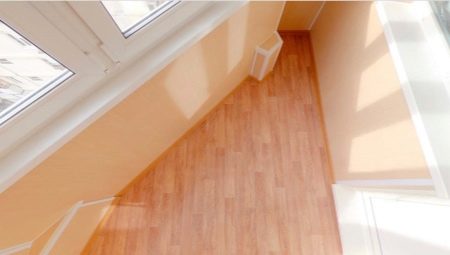The full use of the loggia premises can be prevented by the elementary domestic disorder of this space. But with proper glazing, warming and beautification it can be turned into a home gym or office, a relaxation area with a coffee table or a dressing room for seasonal storage of things. The floor on the loggia is the first thing to start transforming this space with.
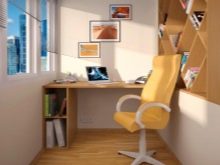
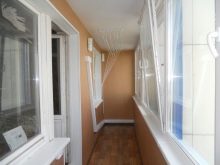
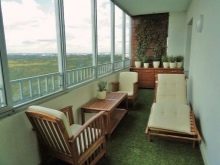
What is it better to make of? What flooring options can be stacked to provide comfort in use? Examples of a wooden, bulk floor will help to understand the problem. Other popular finishes are also worth considering. In this case, solving the issue of thermal insulation and creating a comfortable atmosphere on the loggia will be as easy and simple as possible.
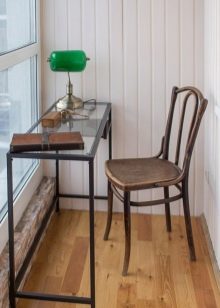
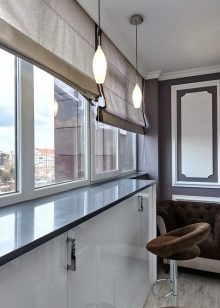
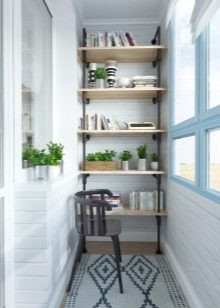
Device
The base of the floor on the loggia is initially a concrete slab, which needs additional thermal insulation. Hide bumps and prepare the base for laying the flooring will help creating concrete screed. You can fill it with beacons and self-leveling mixtures. In addition, you can also provide thermal insulation in different ways - from the "warm floor" to a special box with plates of foam or mineral wool.
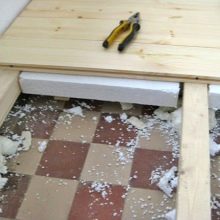
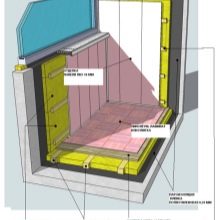
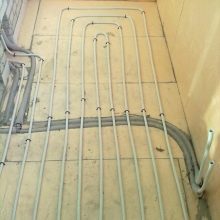
Insulation with wooden logs
The simplest rough floor is created using a timber frame. A cellular structure is created from it, fixed to the loggia frame using anchors. Heat-insulating material is laid inside the formed voids.It could be polystyrene foam, mineral wool. On top of the entire structure, a finishing floor of plywood or chipboard is mounted. The only minus of such a “pie” is that it takes about 10 cm of the height of the room.
It is worth noting that when choosing mineral wool as a heater, it is necessary to take additional care of waterproofing. Otherwise, cold bridges form inside. If there is a risk of increased humidity on the loggia, it is better to choose chipboard that is not subject to deformation for flooring.
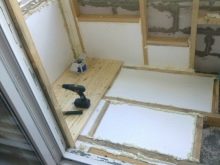
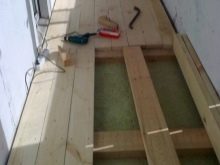
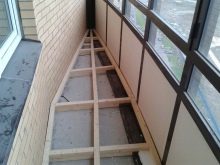
Insulation without lag
If you want to significantly improve the insulating properties of the floor on the loggia, it is possible to make a rough coating of foam blocks with a thickness of 10 cm. On top of it is formed an additional insulating carpet of foam without lag. Next, the installation of the underfloor heating system or finishing flooring is carried out.
When replacing the screed with foam concrete, it is possible to significantly improve the insulation properties of the room, while the installation speed will be significantly higher.
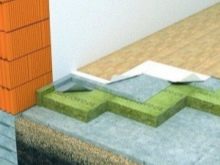
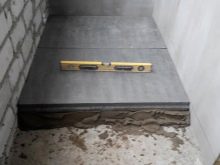
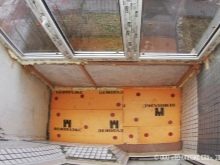
Warm floors on the loggia can be done without screed on the basis of heating mats - they are reliably isolated from external influences. Laminate or other types of coatings can be mounted on top of such a heat source. However, water or electric systems mounted on a screed previously created are much more often used. A special heating circuit is laid here or a film with infrared radiation is used.
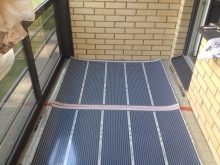
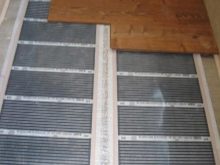
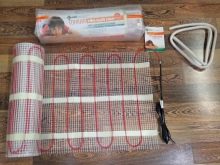
Creating a full water heated floor on the loggia is quite difficult, costly and not too profitable. Electrical systems, although more expensive in content, are much easier to implement. It is worth considering the following points:
- cable mounted in the floor screed with waterproofing and insulation;
- options with heating mats are quite fragile and require constant connection to the network;
- infrared floors are used for auxiliary heating, it is the easiest to install.
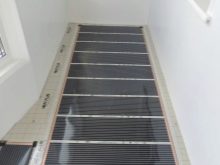
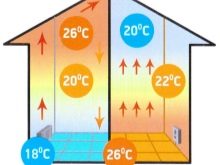
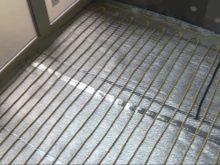
Despite the complexity of installation, it is cable heaters that are suitable for constant year-round use, are considered the best option. In this case, the power of the mounted system per 1 m2 should be at least 200 watts. A suitable cable should have indicators of 22-28 W / m. In addition to it, you still need to take care of connecting the entire system to the thermostat. Connection to the home electrical network occurs later when the screed is completely dry.
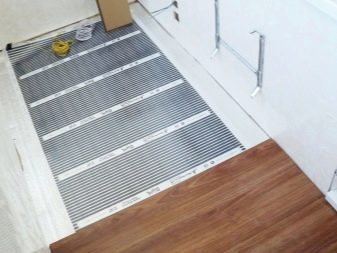
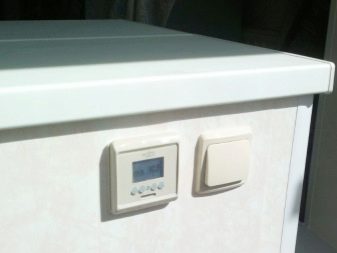
What can be made of?
The flooring on the loggia - heated or simply landscaped for seasonal use, is of great importance. It is not enough just to lay linoleum or lay tiles on top of the clean sheets of plywood, particleboard, covering the rough floating floor. Various finishes allow you to cover the floor beautifully, making it part of the overall space of the apartment or emphasizing the zoning of the room with contrasting decorative techniques. What materials and technologies can be used?
- Polymers A frost-resistant bulk floor is created by analogy with classic concrete screed options. A special mixture is prepared, and then poured, rolled with a special roller that protects against the formation of voids. The finished coating can be decorated in almost any style. But its surface is rather cold and slippery.
- Wood. A classic parquet floor for a loggia with its unstable climatic characteristics is definitely not suitable. But the massive board is consistent with the idea of quality finish. True, it cannot be combined with the underfloor heating system - in winter it will be possible to use the room only with additional heating. As a protective coating can be used paint, varnish or wax-based impregnation.
- Terrace board. If the wooden floor seems too unreliable, you can choose its version, made by high-temperature exposure or by pressing a mixture of sawdust and polymer material.The protective properties of such products are much higher, they are not subject to deformation. On a spacious loggia, the terrace board is in good harmony with the design of the recreation area, it is suitable for combination with panoramic glazing, it gives off heat well.
- Parquet board. The multilayer material is formed from solid wood, but valuable species are placed exclusively on the surface, while at the bottom there is a cheaper coniferous substrate. This option of flooring is ideal for loggias that complement the main space of the kitchen or living room. In such a combined interior, a parquet board will help to add respectability to new areas of the square. Parquet board, in contrast to the array, allows the installation of water or electric underfloor heating.
- Laminate. Wear resistant material for a beautiful and modern finish. A laminate usually has a simple one-click installation system, which makes it easy to lay decorative canvas on the floor. For a balcony, it is better to choose a material of class 32 and higher. The choice of its colors and decor is limited only by the preferences of the residents of the apartment.
- Porcelain tile. Durable material suitable for finishing loggias with the functions of a kitchen or storage system. Under the granite you can lay warm floors of any type. It is durable, practical, you can find a variety of options for its decor. If the loggia is combined with the kitchen, porcelain stoneware will help to perform zoning of the functional areas of the area, in addition, it is suitable for non-insulated rooms.
- Ceramic tiles. A universal option, suitable for glazed rooms, and for open loggias. The material is easy to install, practical, hygienic, can be mounted mosaic, staggered, with longitudinal or transverse laying. Ceramics have high thermal conductivity, it goes well with warm floors, but on an unheated loggia such a coating may seem too cold. When choosing, it is worth making sure that the material is characterized by low water absorption, adapted for use in low temperature conditions.
- Linoleum. The most budgetary option for finishing the floor in the interior of the loggia. PVC-based roll material is cheap, easy to install, and any decorative solution can be matched to it. Natural linoleum is much more expensive, it makes sense to buy it if the floor in the adjoining rooms will have a similar finish. For underfloor heating, only a multilayer heterogeneous linoleum type is suitable.
- Carpet. This material makes it easy to give the loggia room carefree, turns it into a relaxation zone. If you plan to allocate a room for rest or work, such coverage will be a really good choice.
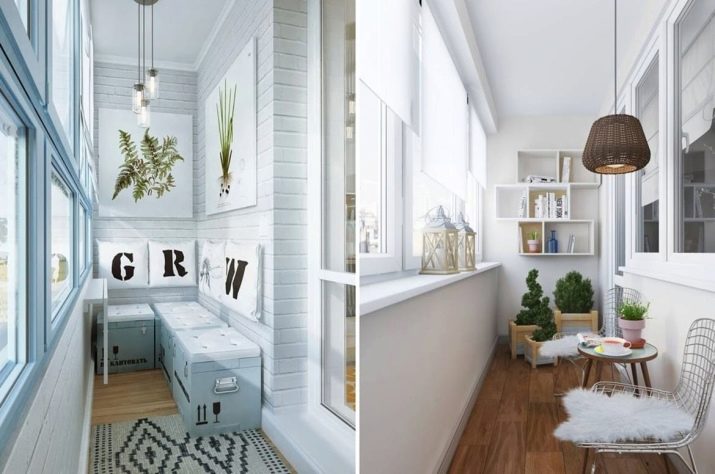
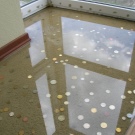
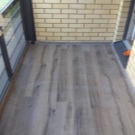
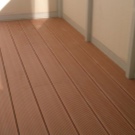
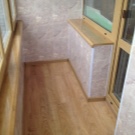
Features of underfloor heating
Heat-insulated floors providing heating in the loggia room are used exclusively in the glazed room. Here, an infrared type of heating can be used, using secondary heat transfer, or direct heat sources: mats, cables, pipes through which the coolant circulates.
It is practically impossible to implement liquid heating in a city apartment due to the complexity of approving such a project and problems in terms of its technical implementation.
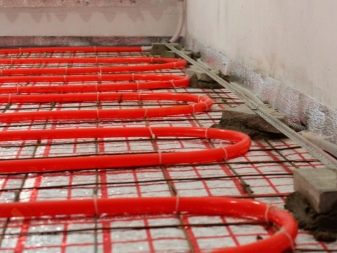
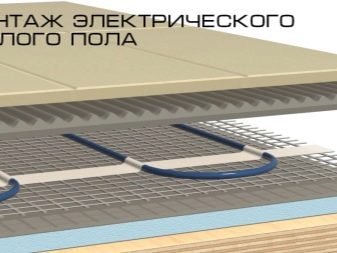
Electric heat-insulated floors are connected to the general system, equipped with individual switches and temperature regulators. Systems based on mats, mounted without screed, are quite fragile, need careful installation. Cables are mounted inside a concrete base, are considered more resistant to operational loads. It is worth paying attention to the fact that installation of furniture is not recommended on the surface where the heating elements lie. It is necessary to design the situation in advance, and it will be difficult to change it later.
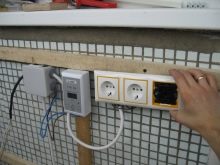
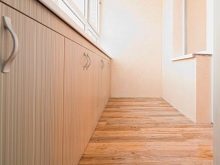
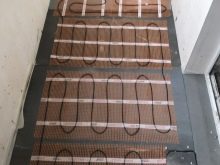
Infrared warm floors are created on a film basis, they are the thinnest and easiest to install.A decorative cover can be mounted directly on top of the rolled roll. It is recommended to lay the floors on a graphite base under the tile, all other coatings will withstand the graphite film.
How to choose a finish?
When choosing a finish for the floor on the loggia, you should pay attention to the following factors:
- design features and layout of the room;
- degree of thermal insulation;
- the presence and type of glazing used;
- desired temperature range.
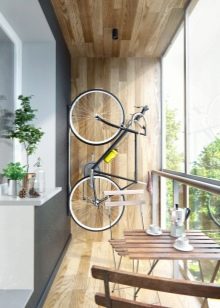
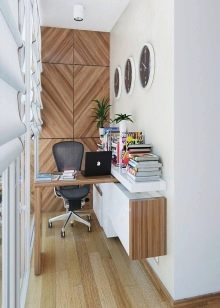
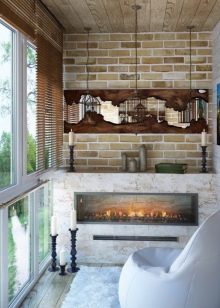
In open-air loggias without a warm floor, it is recommended to use materials that are resistant to thermal expansion and can easily tolerate frost. It is worth paying attention to the fact that only natural minerals belong to this category of materials - granite, marble, basalt, ceramic tiles, granite.
For a cold loggia, you can expand the range of materials used and use a terrace and parquet board, solid wood.
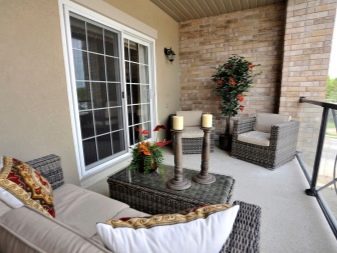
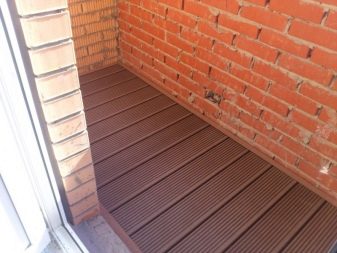
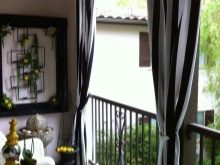
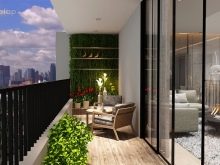
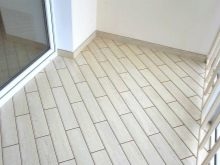
In heated rooms, the whole range of coatings can be used for flooring. In the room combined with the living room or bedroom, it is better to cover it with a laminate, linoleum, carpet.
Interesting solutions
Among interesting examples of flooring on the loggia options that can decorate the interior of a residential apartment can be noted.
- Bright and spacious loggia with ceramic tiles on the floor. Tiles with variegated drawings in rich shades create a special mood in the interior.
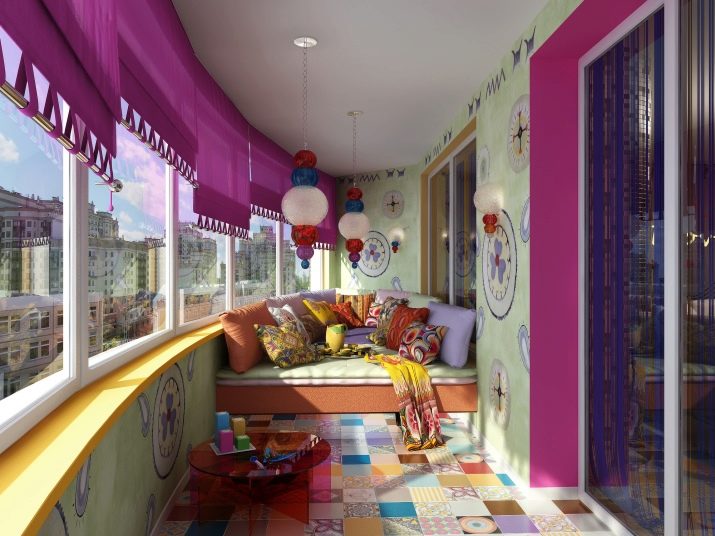
- Porcelain tile in the interior of the loggia looks modern and concise. The dark color and large format of the coating allows you to create an expressive frame for the selected room decor.
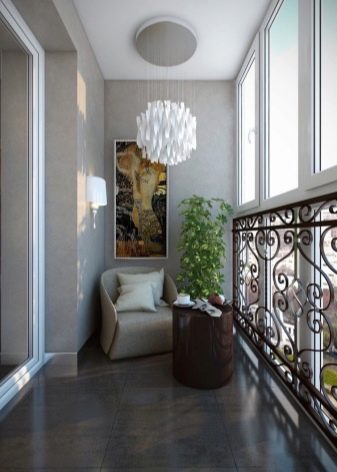
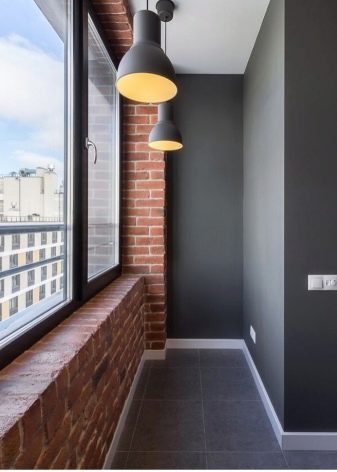
- Terrace board in the design of an open loggia. The material looks interesting and respectable thanks to the parquet laying, harmoniously fitting into the overall design solution.
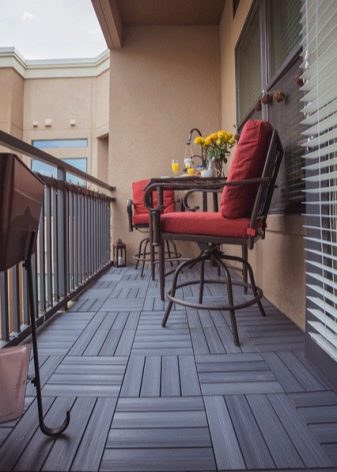
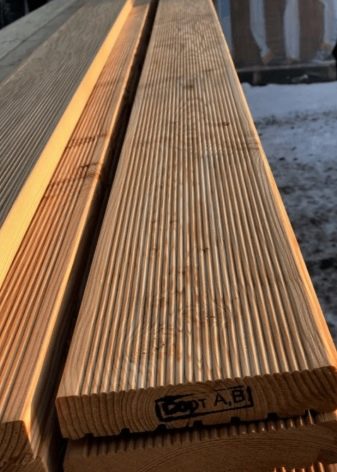
On floor insulation on the loggia, see below.
